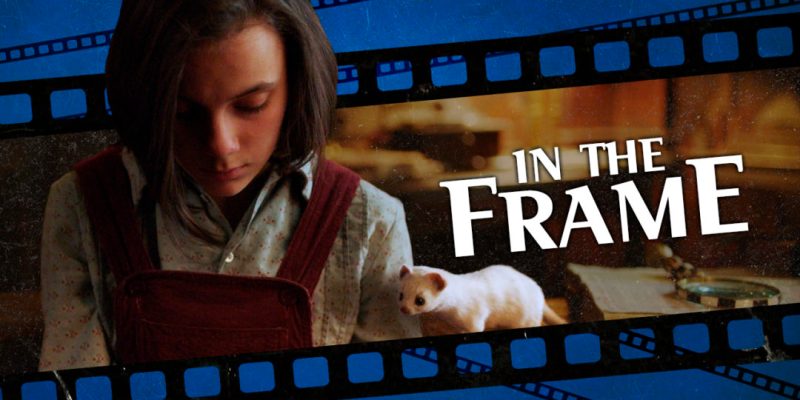This article contains minor spoilers for Philip Pullman’s His Dark Materials series.
The most revealing moment in “Lyra’s Jordan,” the first episode of His Dark Materials, might get lost amid the sound and fury.
Lord Asriel (James McAvoy of X-Men: First Class) is preparing to leave Jordan College in a fully stocked airship. His young ward, Lyra (Dafne Keen of Logan), frets that she has barely had the opportunity to speak with him. The two argue, with Asriel refusing to delay his departure to reconcile with her. As the ship takes flight, Lyra storms off and Asriel is left staring after her.
“She’s better than you think,” shouts Lyra’s friend Roger Parslow (Lewin Lloyd). “She’s special.” The audience knows this to be true. After all, the series opens with a chyron informing the audience that Lyra is the subject of a prophecy from the witches in the North that marks her as the Chosen One. “Everyone’s special!” Asriel responds.
It’s a small moment in an otherwise melodramatic scene, but one with a surprising amount of gravity. It signals that His Dark Materials does not intend to be a simple and straightforward fantasy epic, a tale of heroic destiny fulfilled. Asriel’s response to Roger assures the audience that Lyra is no more important than anyone else, despite happening to be a fantasy protagonist.
The HBO and BBC co-production marks a new attempt to adapt Philip Pullman’s epic fantasy novels, following 2007’s The Golden Compass. That big screen adaptation was clearly intended as a franchise-starter, but it earned lukewarm reviews and underwhelming box office results.

Although it is too early to know for certain, His Dark Materials is off to a much surer start than the cinematic adaptation. Part of this is due to the additional space that television affords the narrative, allowing for deeper characterization, greater development, and more control over pacing.
Part of this is also due to how mass media has changed in the 12 years since the last attempt to translate this story to screen. Pullman’s novels are famously subversive, having been described as “Narnia for atheists” in contrast to the heavily Christian fantasy of C. S. Lewis. Indeed, The Golden Compass faced considerable backlash from religious groups.
His Dark Materials has not been met with the same level of pushback. While executive producer Jane Tranter has promised that the show “is not an attack on religion,” it feels like both its writers and audience are more comfortable dealing with Pullman’s subversive themes than they would have been 12 years ago.

Peter Jackson’s adaptation of The Lord of the Rings codified the archetypal fantasy elements for an entire generation of mass media audiences. While individuals like the wizard Saruman may be corrupted, institutions stand strong. King Théoden of Rohan may be ensorcelled by his advisor Wormtongue, but he is ultimately vindicated as a just ruler. Aragorn might start the story in exile, but he ends it ascending to his rightful place on the Throne of Gondor.
The Golden Compass is a very different type of story. Although the opening text of “Lyra’s Jordan” promises that the eponymous heroine has “a great destiny,” Pullman’s novels eventually reveal that Lyra is “destined to bring about the end of destiny.” Her very existence is a subversion of prophecy and the chosen one narrative.
The Golden Compass arrived in the shadow of The Lord of the Rings trilogy and was produced by the same studio, New Line Cinema. Jackson offered The Golden Compass director Chris Weitz was offered a “one-week crash course” in managing a production of that scale. The film even opens with a labored information dump similar to the exposition provided by Galadriel at the beginning of The Fellowship of the Ring.
In an interview with a Pullman fan site about The Golden Compass, Weitz talked about the challenges in trying to remain faithful to Pullman’s big ideas while also working within a conservative studio system, contending “not only with the difficulties of the material but with the fears of the studio.” Weitz quit the project shortly after giving that interview, and only return when his replacement also quit. Ultimately, Pullman’s ambitious and radical ideas were carefully defanged and ignored so that the film might more closely adhere to studio and audience expectations of what a fantasy epic looked like.

Game of Thrones redefined fantasy television, proving that the medium could offer spectacle on a week-to-week basis and allow literary adaptations more space to unfold. The show also upended the genre’s narrative conventions. Game of Thrones questions the stability and viability of monarchy as a system of rule. It undermines the assumption that a protagonist seeking to reclaim their throne should be assumed to be a hero. It strips away the romanticizing of the medieval feudalist setting found in so many fantasy narratives.
His Dark Materials is as informed by Game of Thrones as The Golden Compass was by The Lord of the Rings. This is most obvious in the decision to close the teaser to “Lyra’s Jordan” with a world-shattering discovery made in the icy extremes of the far north. This mirrors the initial encounter with the White Walkers in the teaser to the Game of Thrones pilot “Winter is Coming.” The show’s opening credits are also obviously indebted to Game of Thrones, depicting the clockwork mechanics that keep the world operating as a literalization of the forces and systems at work in Lyra’s world.
The success of Game of Thrones affords His Dark Materials a greater degree of freedom to tell Pullman’s story, demonstrating to the writers that these narrative subversions can work in television fantasy, while providing the audience with a framework they can use to parse the unfolding narrative. In the books, Pullman’s Asriel is a brutal subversion of the gallant fantasy hero, but The Golden Compass reframed Asriel as a traditional heroic lead played by Daniel Craig fresh from Casino Royale. In contrast, His Dark Materials is comfortable enough to play up his moral ambiguity. However, the most reassuring aspect of “Lyra’s Jordan” is its fundamental rejection of the underlying assumption of so many fantasy narratives in favor of the more humanist ideal that everyone’s special.
